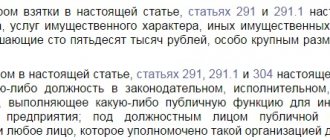Criminal Code of the Russian Federation in the latest edition:
Article 164 of the Criminal Code of the Russian Federation. Theft of items of special value
1. Theft of objects or documents of special historical, scientific, artistic or cultural value, regardless of the method of theft -
shall be punishable by forced labor for a term of up to five years with or without restriction of liberty for a term of up to one year, or by imprisonment for a term of up to ten years with a fine in the amount of up to five hundred thousand rubles or in the amount of the wages or other income of the convicted person for a period of up to three years, or without it and with or without restriction of freedom for up to one year.
2. The same act:
a) committed by a group of persons by prior conspiracy or by an organized group;
b) has become invalid. — Federal Law of December 8, 2003 N 162-FZ;
c) resulting in the destruction, damage or destruction of objects or documents specified in part one of this article -
shall be punishable by imprisonment for a term of up to fifteen years with or without a fine in the amount of up to five hundred thousand rubles or in the amount of the wages or other income of the convicted person for a period of up to three years and with or without restriction of freedom for a term of up to two years.
Return to the table of contents of the document: Criminal Code of the Russian Federation in the latest edition
Comments on Article 164 of the Criminal Code of the Russian Federation
Subject of the crime . Article 164 of the Criminal Code of the Russian Federation provides for criminal liability for theft in any of six forms if it is committed in relation to a special subject of the crime - objects or documents of special historical, scientific, artistic or cultural value.
The objects of the crime can be ancient manuscripts, icons, household items, unique museum exhibits or works of art, etc.
To qualify the offense under Art. 164 of the Criminal Code of the Russian Federation, a special value should not be property (calculated in money), but cultural (historical, scientific, artistic or other cultural) value. The bearer of this value can be not only things in the strict sense of the word, but also other objects and documents, including those that do not have a market price (for example, documents of scientific value).
The special historical, scientific, artistic or cultural value of stolen objects or documents (Article 164 of the Criminal Code of the Russian Federation) (regardless of the method of theft) is determined on the basis of an expert opinion, taking into account not only their value in monetary terms, but also their significance for history, science, art or culture (clause 25 of the Resolution of the Plenum of the Supreme Court of the Russian Federation of December 27, 2002 N 29 “On judicial practice in cases of theft, robbery and robbery”).
In criminal cases under Art. 164 of the Criminal Code of the Russian Federation with objects, documents that have a special historical, historical-cultural, etc. value, state awards, coin collections, ancient icons and commemorative breastplates of the Russian Empire, etc. are recognized.
The theft of items of special value is not a form, but a type of theft . Objective and subjective signs of theft are disclosed in the commentary to Art. 158 of the Criminal Code of the Russian Federation.
The objective side of the crime involves theft in one of six forms, the signs of which are discussed in the comments to Art. 158 - 162 of the Criminal Code of the Russian Federation (theft, fraud, misappropriation or embezzlement, robbery and robbery).
The objective side consists of the unlawful gratuitous seizure of objects or documents of special value from someone else’s legal possession and (or) their circulation in favor of the perpetrator or other persons.
The method of theft can be secret or open, violent or non-violent; theft may be committed by deception or breach of trust.
The end of the theft . The solution to the question of when the theft of objects or documents of particular value will end depends on the method of the crime. In the case of theft of these items or documents through theft, fraud, misappropriation, embezzlement, robbery, the crime is over from the moment when the stolen property came into the illegal possession of the perpetrator or other persons and they received a real opportunity to use or dispose of it at their own discretion.
The moment of the end of robbery aimed at stealing items of special value . Theft by robbery of objects of special value should be considered completed from the moment of the attack, combined with violence dangerous to the life and health of the victim, or with the threat of such violence. There is another point of view, according to which robbery for the purpose of stealing items of particular value, not resulting in their seizure, should be qualified as an attempted crime under Art. 164 of the Criminal Code of the Russian Federation.
If the act contains qualifying features provided for in Art. 158 - 162 of the Criminal Code of the Russian Federation (main forms of theft), but not provided for in Article 164 of the Criminal Code of the Russian Federation (committing theft with illegal entry into a home, premises or other storage facility, causing grievous harm to the health of the victim, etc.), the crime committed should be qualified as a crime provided for Art. 164 of the Criminal Code of the Russian Federation, in combination with crimes, the independent composition of which forms an act provided for as qualifying for the main forms of theft. For example, in combination with the act provided for in Art. 139 of the Criminal Code of the Russian Federation, in case of penetration into a home or as provided for in Art. 111 of the Criminal Code of the Russian Federation, if serious harm to health is caused. Other similar circumstances are taken into account as aggravating punishment in cases provided for by law, for example, the use of weapons requires the use of paragraph “k” of Part 1 of Art. 63 of the Criminal Code of the Russian Federation (if there are grounds for this, the act taken in its entirety must also be qualified under Article 222 of the Criminal Code of the Russian Federation).
The subjective side of the crime. On the subjective side of theft, see comments to Art. Art. 158, 159 of the Criminal Code of the Russian Federation.
Guilty for imputing him to a crime under Art. 164 of the Criminal Code of the Russian Federation, must be aware of the features of the item or document he is stealing, in any case, such features must be covered at least by intent that is not specified in this part, meaning that the person also assumes that the item of the theft has a special historical nature, etc. value. Such intent is direct, and if the item really turns out to be especially valuable based on the expert opinion, the act must be qualified under Art. 164 of the Criminal Code of the Russian Federation, otherwise the offense should be qualified under Art. Art. 158, 159, 160, 161 or 162 of the Criminal Code of the Russian Federation.
The subject of the crime is a general person - a sane individual who has reached the age of 16. However, if the theft of the relevant item or document is committed in the form of theft, robbery or robbery by persons aged 14 to 16 years, the act entails liability, respectively, under Art. 158, 161 or 162 of the Criminal Code of the Russian Federation.
Commentary to Art. 164 Criminal Code
1. The commented article implies liability for theft in any of six forms if it is committed in relation to a special subject of the crime - objects or documents of special historical, scientific, artistic or cultural value.
The special historical, scientific, artistic or cultural value of stolen objects or documents must be determined on the basis of an expert opinion, taking into account not only their monetary value, but also their significance for history, science, art and culture.
2. The objective side of the crime involves theft in one of six forms (see comments to Articles 158 - 162 of the Criminal Code).
3. When assessing whether a crime was committed by a group of persons by prior conspiracy or by an organized group (clause “a” of part 2), one should focus on clauses 8 - 13 of the Resolution of the Plenum of the Supreme Court of the Russian Federation of December 27, 2007 N 51 “On judicial practice in cases of fraud, misappropriation and embezzlement” or paragraph 21 of the Resolution of the Plenum of the Supreme Court of the Russian Federation of December 27, 2007 N 51 “On judicial practice in cases of fraud, misappropriation and embezzlement.”
Destruction and destruction of objects and documents (clause “c” of Part 2) involves rendering them completely unusable or physically destroyed, and their damage means partial damage.
Qualifying features
The content of the qualifying signs of theft of items of special value: theft by a group of persons by prior conspiracy and by an organized group is disclosed in the comments to Art. 158 of the Criminal Code of the Russian Federation.
Destruction, damage or destruction. Destruction, damage or destruction of objects or documents is provided as a qualifying feature of the crime.
Destruction and destruction of objects and documents (clause “c” of Part 2 of Article 164 of the Criminal Code of the Russian Federation) involves rendering them completely unusable or physically destroyed, and their damage means partial damage.
To impute clause “c” of Part 2 of Art. 164 of the Criminal Code of the Russian Federation requires a causal connection between theft and destruction, damage or destruction of valuable items. Guilt in relation to these consequences can be expressed both in the form of intent (for example, if the offender damages a picture by cutting it out of the frame) and in the form of negligence (for example, if the harm is caused as a result of careless or frivolous handling of a stolen valuable item).
Distinction from related crimes
Theft of valuable items can be committed in different forms:
- theft;
- fraudulent activities;
- misappropriation or embezzlement;
- robbery;
- robbery.
The form of theft does not affect the size and type of punishment, but it does affect the identification of the moment of completion of the offense, for example, with theft, the moment of the end of the offense occurs at the moment when the item is seized and the attacker has the opportunity to use the stolen item.
If things of special value were obtained through extortion, then such a crime is considered under Article 163 of the Criminal Code of the Russian Federation, since extortion is not theft.
Extortion is aimed not only at property relations, but also at the health of the victim, even to the point of murder. Taking possession of a car with driving documents or another type of vehicle without the purpose of stealing, that is, when the vehicle is stolen, is punishable under Article 166 of the Criminal Code of the Russian Federation.
In the event that the destruction of objects was committed through negligence, then liability arises under Article 168 of the Criminal Code of the Russian Federation. The type of punishment is assigned by the court.
Article 164 of the Code of Criminal Procedure of the Russian Federation. General rules for conducting investigative actions (current version)
1. Investigative actions provided for in Articles 178, Part Three, 179, 182 and 183 of this Code are carried out on the basis of a decision of the investigator.
2. In the cases provided for in paragraphs 4 - 9, 11 and 12 of part two of Article 29 of this Code, investigative actions are carried out on the basis of a court decision.
3. Carrying out investigative actions at night is not allowed, except in urgent cases.
4. When carrying out investigative actions, the use of violence, threats and other illegal measures, as well as creating a danger to the life and health of the persons participating in them, is unacceptable.
4.1. When carrying out investigative actions in criminal cases of crimes provided for in Articles 159 parts one - four, 159.1 - 159.3, 159.5, 159.6, 160, 165 and 201 of the Criminal Code of the Russian Federation, if these crimes are committed by an individual entrepreneur in connection with his business activities and (or) management of property belonging to him, used for the purposes of entrepreneurial activity, or if these crimes were committed by a member of the management body of a commercial organization in connection with the exercise of his powers to manage the organization or in connection with the implementation of entrepreneurial or other economic activities by a commercial organization, as well as Articles 159 parts of the fifth - seventh, 171, 171.1, 171.3 - 172.2, 173.1 - 174.1, 176 - 178, 180, 181, 185, 185 - 185.4 and 190 - 199.4 of the Criminal Code of the Russian Federation, unreasonable use of measures that may lead to suspension is not allowed to lead legal activities of legal entities or individual entrepreneurs, including the unreasonable seizure of electronic storage media, except for the cases provided for in part one of Article 164.1 of this Code. During investigative actions, it is also not allowed to seize a special declaration filed in accordance with the Federal Law “On the voluntary declaration by individuals of assets and accounts (deposits) in banks and on amendments to certain legislative acts of the Russian Federation”, and (or) documents and information attached to the said declaration.
5. The investigator, inviting participants in criminal proceedings specified in Chapters 6 - 8 of this Code to participate in investigative actions, verifies their identity, explains to them their rights, responsibilities, as well as the procedure for carrying out the corresponding investigative action. If a victim, witness, specialist, expert or translator participates in the investigative action, he is also warned of the responsibility provided for in Articles 307 and 308 of the Criminal Code of the Russian Federation. If an investigative action in a criminal case against accomplices of a crime involves a person in respect of whom the criminal case has been separated into separate proceedings in connection with the conclusion of a pre-trial agreement on cooperation with him, then he is warned about the consequences of failure to comply with the conditions and non-fulfillment provided for in Chapter 40.1 of this Code obligations stipulated by the pre-trial cooperation agreement, including in the case of deliberate reporting of false information or deliberate concealment of any significant information from the investigation.
6. When carrying out investigative actions, technical means and methods of detecting, recording and seizing traces of a crime and material evidence may be used. Before the start of an investigative action, the investigator warns the persons participating in the investigative action about the use of technical means.
7. The investigator has the right to involve an official of the body carrying out operational investigative activities in participation in the investigative action, about which a corresponding note is made in the protocol.
8. During the investigative action, a protocol is kept in accordance with Article 166 of this Code.











